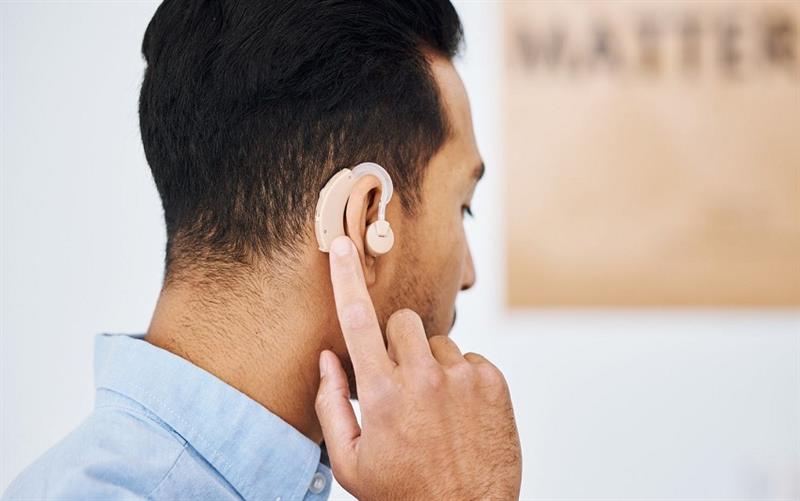
The effects of hearing loss can range from infancy to old age (60s and 70s). Although a variety of factors can lead to hearing loss, loud noise exposure is the most frequent cause of the condition. Reversing hearing loss is not possible; nevertheless, corrective surgery can enhance auditory perception. Hearing aids are one device that helps lessen hearing loss.
When your hearing system is compromised, hearing loss results. You could find it difficult to comprehend, follow, or participate in conversations if you have hearing loss. You could find it difficult to follow dialogue when watching television, to participate in online meetings, or to hear phone conversations.
Your ability to work, interact with people, and simply enjoy life can all be negatively impacted by hearing loss. Hearing loss is typically irreversible. However, medical professionals who specialize in identifying and treating hearing loss, known as audiologists, can be of assistance. They are able to suggest therapies that lessen hearing loss, such as cochlear implants or hearing aids.
Different kinds of hearing loss
Three categories of hearing loss exist:
1. Loss of hearing due to conductivity:
Something prevents sound from entering your inner ear or exiting your outer ear (ear canal) in those with this type of hearing loss.
2. Hearing loss caused by sensory neurons:
Your inner ear gets damaged over time and causes this hearing loss. Sensorineural hearing loss rarely occurs rapidly. This is sudden deafness, often known as sudden sensorineural hearing loss (SSHL). SSHL might occur over several days or all at once.
3. MIxed:
This is the result of problems in the inner ear (sensorineural hearing loss) and middle or outer ear (conductive hearing loss).
Lifestyle Tips to help stop hearing loss
1. Take care of your heart and blood pressure:
Damage to the delicate systems inside your ear that aid in hearing can be caused by heart disease and high blood pressure. Adhere to your doctor's treatment recommendations if you have high blood pressure or cholesterol in order to lower your levels.
2. Give up smoking and vaping, and drink in moderation:
There is little doubt that exposure to cigarette smoke, whether it be firsthand, secondhand, or even during pregnancy, can significantly affect an individual's hearing health. The same is true of excessive alcohol consumption, which can harm the environment inside the ear. Although there isn't as much research on vaping and hearing loss, there have been anecdotal stories connecting the two.
3. Manage your diabetes:
Studies have indicated that hearing loss is twice as common in those with diabetes. Diabetes has the same potential to harm inner ear cells as high blood pressure. To manage your diabetes, keep your blood sugar under control and heed your doctor's advice.
4. Engage in physical activity and stress management techniques:
What is exercise not beneficial for? Exercise has numerous health benefits for your body, including improved blood flow to your ears. (Just use caution when it comes to loud music and improper weightlifting techniques at the gym; both can cause hearing damage.) And because chronic high levels of stress aren't good for your hearing (or the rest of you), do what you can to keep stress levels under control.
5. Consume foods rich in specific minerals and vitamins:
Did you know that healthy hearing depends on a number of vitamins and minerals, particularly magnesium, potassium, and B12? Eating a diet high in iron is recommended since iron-deficiency anemia has been related to hearing loss.
6. Understand your ancestry:
Although hearing loss cannot be immediately prevented, being aware of your family history can help you determine whether you are at an increased risk. Early detection can lower your chance of developing hearing loss's detrimental effects, which include social isolation, depression, and cognitive impairment.
7. Recognize which medications can cause hearing loss:
Numerous prescription and over-the-counter medications have been connected to hearing loss. These ototoxic drugs include IV antibiotics, chemotherapeutic treatments, and common over-the-counter medications like aspirin. In rare circumstances, you might be able to lower your risk of drug-related hearing loss by switching to a different medication.
8. Reduce the likelihood of noise-induced hearing loss (NIHL):
If you don't use hearing protection in noisy surroundings, you could end up with hearing impairment even if you're an Olympian and just eat salads all day. When you're going to be around loud noises, it's always a good idea to safeguard your hearing, regardless of your age or hearing status. There's nothing more detrimental to your hearing, to put it simply.
It's ideal to keep yourself as educated with your hearing aids and a new breakthrough in the technology. Ask your query via Book an Appointment today. For more information visit https://hearing.careinc.ca or you can call us today at (403)605-6300